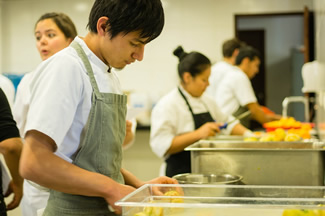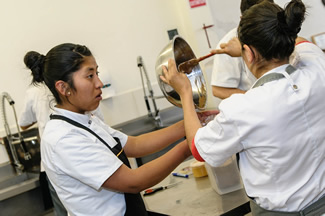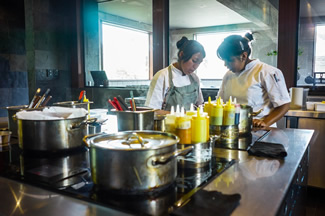Cafeterias and cooking schools generate new opportunities for youths from El Alto city
On June 2nd, the MANQ'A Project initiates its activities, inaugurating the first four schools of a total of 14 during the course of the next few months. This program will be implemented in different areas of the city of El Alto.
With the objective of improving the quality of life of the community of El Alto, within the principles of gender equality, cultural diversity, and food safety, this June 2nd the MANQ'A Project will initiate its activities, promoted and executed by MeltingPot Bolivia, with the support of CAF, Development Bank of Latin America, ICCO Cooperacion Sudamerica, and i3 Impacto Social.
Each one of the MANQ'A schools (Aymara word for food) will train youths from at-risk vulnerable segments of the population in gastronomic areas, from the ages of 16-28, benefitting approximately 3,000 adolescents and young adults of the city of El Alto. One hundred percent of the teaching-learning model will be based on practice.
Each school is also a cafeteria or popular diner that will provide the students the tools to develop themselves in a new occupation, improve the diets of the people in each community through the adequate use of local ingredients, and improve family consumer habits. The program will include talks, workshops, and courses regarding hygiene and nutrition for neighbors, gastronomic business owners, and street vendors.
The schools of this first phase will be located in the areas of Santa Isabel, Primero de Marzo, Franz Tamayo, and Santa Rosa. The first school, located in the Santa Isabel Urbanization, will initiate activities on June 2nd with bread baking, pastry, and national and international cuisine courses. It is important to highlight that the project has made strategic alliances with neighborhood associations from different districts of the city of El Alto, whose support and contributions have been essential for the implementation of the project.
CAF's more recent content

CAF, ECLAC, IDB and PAHO Promote Sustainable Development in the G20
The Regional Organizations of the Americas congratulate Brazil on its successful G20 Presidency, highlighting its leadership on key issues such as poverty, governance, and climate change. They also reaffirm their commitment to actions that promote equity and development in the region.
Urgent Call for Action to Safeguard Caribbean SIDS at CAF Symposium
As the global community grapples with the escalating climate crisis, Caribbean Small Island Developing States (SIDS) are running out of time to secure critical investments and support needed to strengthen their economies and protect vulnerable communities from the intensifying impacts of climate change. With the window to take decisive action rapidly shrinking, CAF - Development Bank of Latin America and the Caribbean, in partnership with the Commonwealth Secretariat and the Antigua and Barbuda High Commission, brought together key stakeholders for a symposium in London to address the critical vulnerabilities Caribbean SIDS face.


